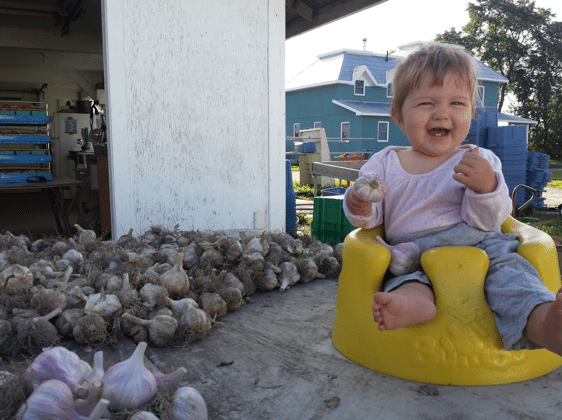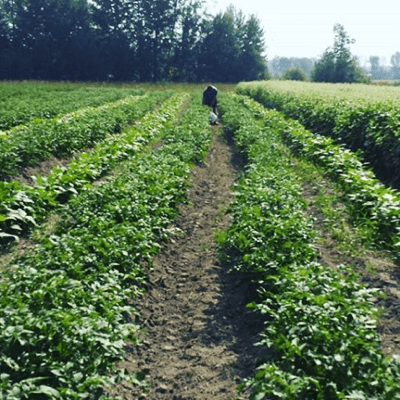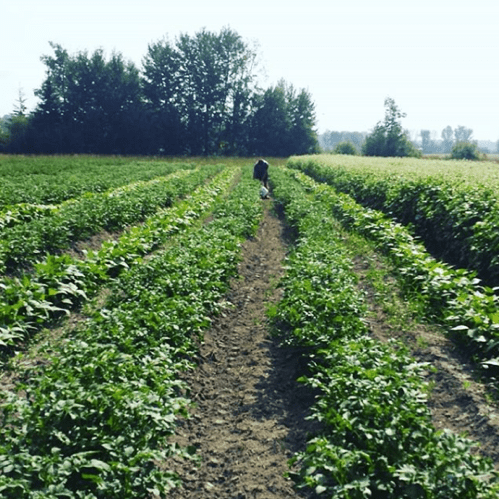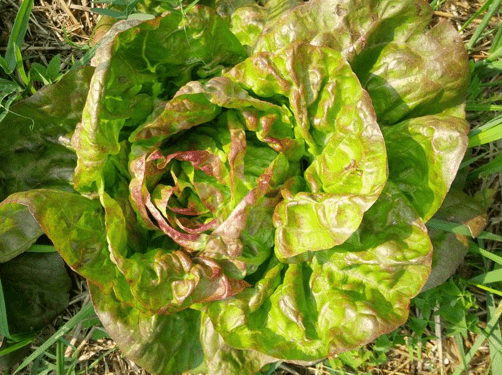Written by Victoria Lesy, Matt Orton, Abdul-Rahim Abdulai, Nicole Unterlander, Abigail Van Reisen from the Arrell Food Institute, University of Guelph; in collaboration with Thorsten Arnold, Ecological Farmers Association of Ontario.
This story is part of a series of case studies documenting the experience of 6 EFAO member farmers as they adapt to climate change on their farms.
Field Good Farms is a bio-intensive 5-acre vegetable operation in Cache Bay, located near Lake Nipissing in Ontario’s north. Isabelle Spence-Legault and her husband Ryan Spence established the farm in 2011 and have been farming full time since 2012. They have two greenhouses dedicated to growing vegetables. The two relish selling everything directly to customers – around 90% through a CSA – complemented with online marketing and sales to local restaurants. Like many other farmers, climate variability is one of the biggest threats to the farm. Isabelle does not have to look back far to remember how climate variability has influenced their operation: “I would say last summer was probably one of the most challenging since becoming experienced farmers.” The season was hot and dry, and soil moisture was not able to support plant growth. This situation was compounded by operating within a majority conventional farming community that does not share similar values and could not offer advice.
Rows of beans planted in between rows of potatoes, with a heavy buckwheat buffer at the edge of the field. “We use no pesticides on our farm (not even organically approved), so the many rows of potatoes are rid of the Colorado potato beetle by hand (we shake the plants into 5 gal buckets we carry along with us). The beneficial get scooped out before we fill the bucket with water.” (Field Good Farms)
Climate impacts go beyond seasonal variability and also influence cycles of pest pressure, which according to Isabelle has equally positive and negative consequences. With last year’s dry weather that weakened plants, bug pressure is mounting. But in cycles of wet summers, she has also seen beneficial thrive and help in their production.
But climate change also changes the everyday experiences of farmers and their mental stability and resilience:
“Another important point is that it doesn’t only have an impact on the flora and fauna, but it also has an impact on the psyche of the farmer. My partner and I have been working so hard dealing with unexpected issues. We cannot really predict much. It makes it challenging. Not just for production management but also for the well-being of the staff working outside.”
The situation is concerning, especially for ecological farmers who rely on manual labour where conventional operators use chemical inputs. She recounts how other farmers are making compromises with their ecological values when struggling with the impacts of climatic variability, by ‘switching to safer models.’ This includes the use of biodegradable plastics on the farm, which they shy away from.
“Head lettuce is superior to the much-more lucrative cut greens, but we prefer the fact that we don’t have to bag the head lettuce (plastic bags are yucky), and that they store longer in people’s fridge, which we hope translates to less food waste. Also, straw mulch is a great option, and seems to do just as well for us than what we used to use, biodegradable plastic mulch, which has been phased out of our farm (we use landscape fabric to smother in advance of planting perennials to avoid tillage, and in our high tunnels, but avoid it as much as possible)” (Field Good Farms)
With all the concerns, there are ways farmers can continue to be ecologically resilient, Isabelle opines. To “feel good” amidst climate change, many practical measures have been put in place and she plans for further investments. For example, planting approximately 4500 trees to balance their microclimate while sequestering carbon, planting food-producing perennials adapted to their climate, and building improved greenhouses for transplants to support stronger seedlings. They also plan to dig a pond that will help store water for hot summers like the one in 2018.
Despite all these measures, Isabelle finds that resilience is a matter beyond the farm gate that requires a holistic approach. Their CSA marketing is one of their strategies that reduces marketing uncertainty and her anxiety of thinking about the sales, so she can better focus on production:
“But generally, [we are] just trying to build in more resilience; the CSA helps with that as it erases some of the lack of understanding which comes with standing on the other side of the booth selling a commodity. The result of this is an inability to have an immediate dialogue with the consumer about the best ecological practices. We can have that dialogue with clients of our CSA, and can invite them to the farm to see some of the things we talk about inaction.”

 The hardworking farmers behind Field Good Farms; Isabelle (right) and Ryan (left) (Field Good Farms)
The hardworking farmers behind Field Good Farms; Isabelle (right) and Ryan (left) (Field Good Farms)
If anything has proven vital to Field Good Farms, then it is the CSA; but how can other farmers also become resilient within our challenging climate? Isabelle has simple advice: there is a lot of knowledge out there, complimented by a buzzing new interest in agriculture by some youth. Farmers must take advantage of this mix of old and new and share knowledge on how to become better at what they do and love. And it is important to increase resilience and restore farm ecologies: “There are models out there, no-till models like the one at Singing Frogs Farm in California. I can empathize with the amount of pressure put on us as farmers. All sorts of constraints seem to bind us, but, if we aren’t creating a regenerative model and sticking to sustainability peppered with convenience, then we aren’t advancing the food system, which, beyond food production, should be our goal.”
If farmers are open to the endless possibilities of today, then they can thrive and build resilient operations. Nonetheless, in these times of overall uncertainty, external support for learning, knowledge exchange, research, and access to investment capital area vital necessity, as well as funding for research and capacity building for organizations like the EFAO and universities. However, it would prove very useful if knowledge generation and dissemination were generally more relevant to farmers through farm-based research that meets the needs of those who use it.

Isabelle and Ryan’s daughter Madeline during garlic cleaning (Field Good Farms)





